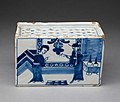Flower brick
A flower brick is a type of vase, cuboid-shaped like a building brick, and designed to be seen with the long face towards the viewer.[1][2]
Traditional flower bricks are made of a ceramic material, usually delftware or other tin-glazed earthenware.[3][4][5][6][7] The top surface has a large hole into which water is poured, and a number of smaller holes into which flower stems are inserted, so that the flowers are kept in position. These vessels are a sub-type of the boughpot or tulipiere, which have more rounded shapes.[3] Flower bricks are thought to have been the most common vessel for flowers besides vases in the 18th century.[7]
Some scholars suggest that flower bricks may have been used as quill holders and inkwells during the 17th century, although this is debated.[6] There are few surviving pictorial representations of these objects in use during the 17th or 18th century.[6]
Examples
-
 English flower brick, c.1750-1760, by unknown maker. Tin-glazed earthenware (delftware), 3 1/2 × 2 3/8 × 5 1/2 in. (8.9 × 6 × 14 cm). Museum of Fine Arts, Houston.
English flower brick, c.1750-1760, by unknown maker. Tin-glazed earthenware (delftware), 3 1/2 × 2 3/8 × 5 1/2 in. (8.9 × 6 × 14 cm). Museum of Fine Arts, Houston. -
 Flower brick (c. 1750), London. Tin-glazed earthenware, 14.6 × 9.2 × 7.3 cm (5 3/4 × 3 5/8 × 2 7/8 in.). Art Institute of Chicago.
Flower brick (c. 1750), London. Tin-glazed earthenware, 14.6 × 9.2 × 7.3 cm (5 3/4 × 3 5/8 × 2 7/8 in.). Art Institute of Chicago. -
 Flower brick, Liverpool, England. Tin-glazed earthenware, made in Liverpool around 1760. Walker Art Gallery.
Flower brick, Liverpool, England. Tin-glazed earthenware, made in Liverpool around 1760. Walker Art Gallery.
References
- ^ "BBC One - Antiques Roadshow, Series 36, Sainsbury Centre Norwich 1, English Delftware flower bricks". BBC Online. 12 January 2014. Retrieved 21 May 2015.
- ^ "Flower brick". Victoria and Albert Museum. 1760. Retrieved 21 May 2015.
- ^ a b Geall, Christin (2020). Cultivated : the elements of floral style. Erin Benzakein (1st ed.). New York. p. 53. ISBN 978-1-61689-932-5. OCLC 1146232983.
{{cite book}}: CS1 maint: location missing publisher (link) - ^ Marking time : objects, people, and their lives, 1500-1800. Edward Town, Angela McShane, Yale Center for British Art. New Haven. 2020. ISBN 978-0-300-25410-5. OCLC 1139014022.
{{cite book}}: CS1 maint: location missing publisher (link) CS1 maint: others (link) - ^ Dawson, Aileen (2010). English & Irish delftware 1570-1840. London: British Museum Press. ISBN 978-0-7141-2810-8. OCLC 501396922.
- ^ a b c "Flower brick". Five Colleges and Historic Deerfield Consortium Collections Database. Retrieved 2021-10-26.
- ^ a b "Unknown English Flower Brick". The Museum of Fine Arts, Houston.
- v
- t
- e












